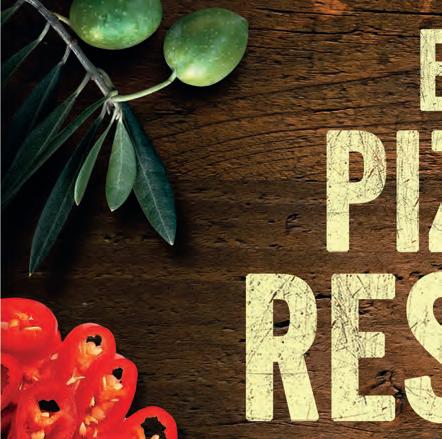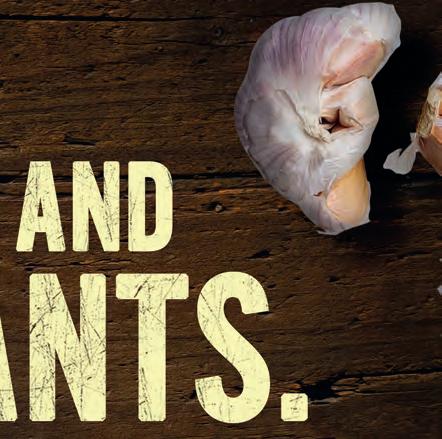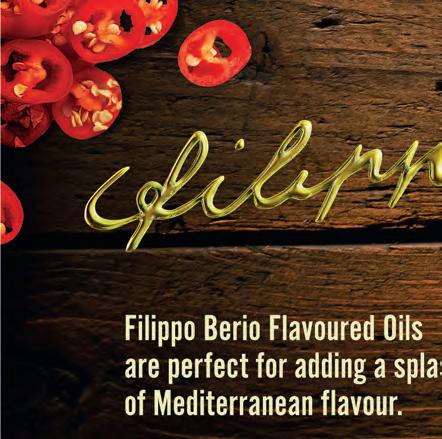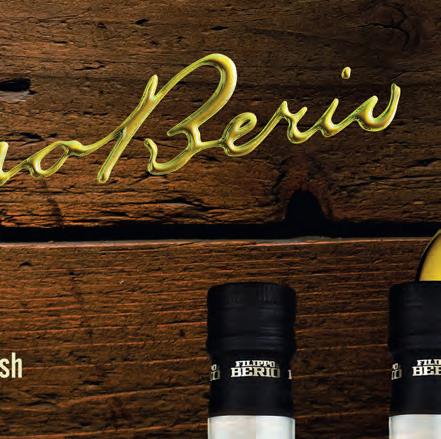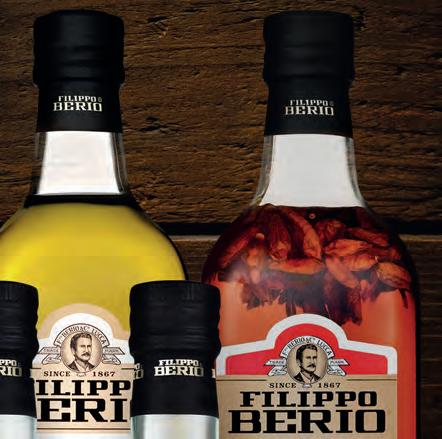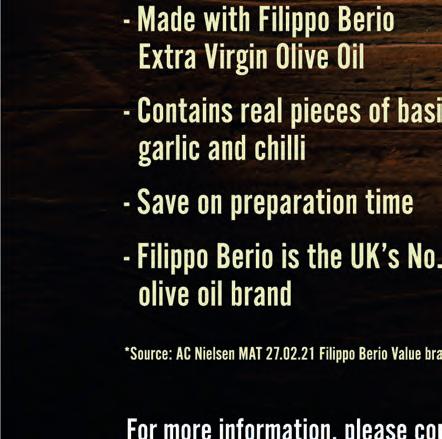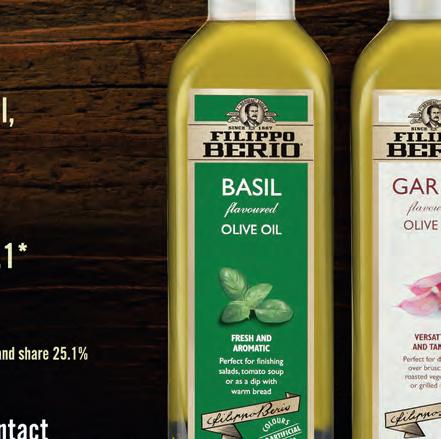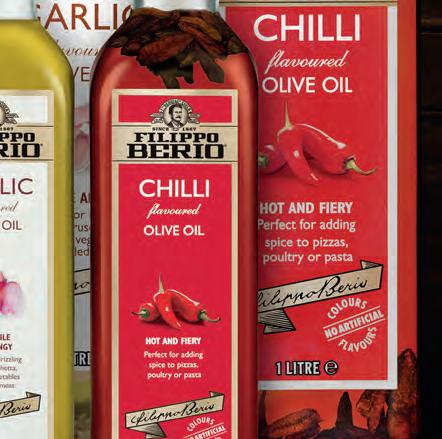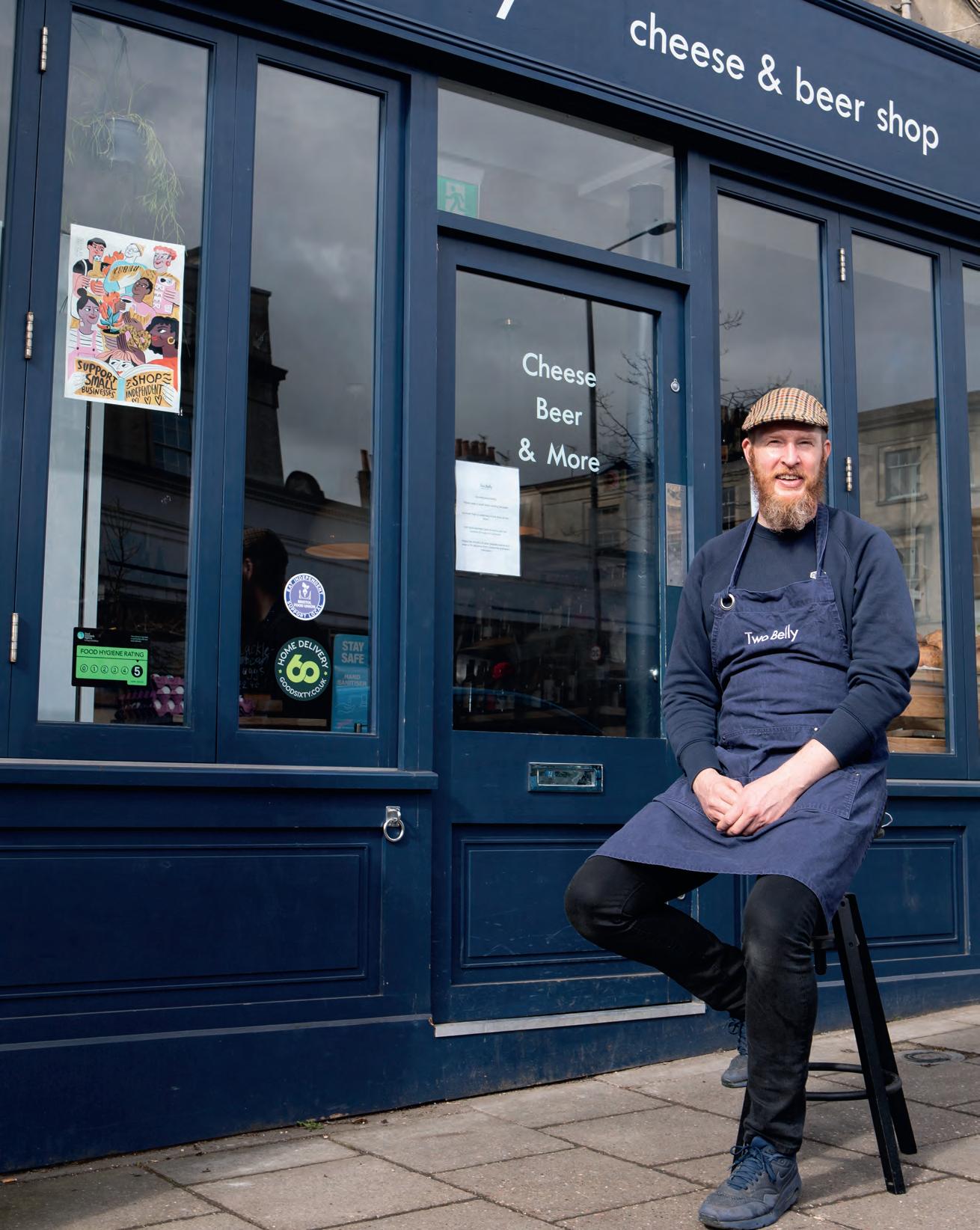
12 minute read
SHOP TALK
from FFD May 2021
IF I’D KNOWN THEN WHAT I KNOW NOW...
DOM PULSFORD, co-founder, Two Belly, Bristol
The name Two Belly isn’t – as many people assume – about eating in excess. It’s about two people (me and my wife, Lara) pursuing a life in food and drink. When we met, Lara was in beer sales and I was managing The White Horse in Parsons Green. We fell in love with one another and with the idea of embarking on a joint venture involving artisanal beer and cheese. I did the Retail Ready course and Level 1 of the Academy of Cheese with the Guild of Fine Food. Emboldened by their encouragement, I handed in my notice and, in late 2017, went for a seasonal job at Neal’s Yard Dairy. I was completely open about what I wanted to do. I immersed myself in cheese and did as many extra shifts as I could.
By this point, we had found a site. It was a ‘first fix’ with A1, A2 and A3 shop use, so perfect. It had previously been an off licence, which stood us in good stead for what we were planning to do.
Our vision was to combine the best UK farmhouse cheese with the best beers from Bristol, the UK and abroad (the Belgians make some fantastic beer for cheese) in a retail setting with an eat-in offer. We installed a big sharing table where people could sit and eat cheeseboards and toasties, and held tasting events, which made us a really popular and exciting venue.
Obviously, the pandemic forced us to change tack. It accelerated the development of our online shop and, by the third lockdown, we had completely shifted to a retail model. We put in extra shelves in place of the sharing table and expanded our range. We still do our takeaway toasties, as our regulars would object if we stopped those!
This period taught us that there is no point in sticking to a plan if it’s not working. We started out focusing on British cheese but extended this to include French and Swiss cheeses in response to customer demand. Also, at the start, we stocked five or six natural wines; now we sell upwards of 80. We see all of these changes as a positive evolution. Going forward, we are going to stick to retail on this site. We know our hospitality format works, but these premises are too small to do both. In future, we hope to launch something akin to what we were doing originally – a beer and cheese bar – at a different location.
In the midst of the pandemic, our bread supplier opened a food shop on the opposite side of Bristol and asked us to run the cheese counter. It’s been a good way to test our ability to run a second site. We have learned that it is achievable and it helps that we already have a name in Bristol, but we are still having to build loyalty from scratch. It is almost like starting another business in terms of the time and effort it requires.
CONFESSIONS OF A DELI OWNER
ANONYMOUS TALES FROM BEHIND THE COUNTER
OK, BE HONEST. Who is a tad nervous about reopening their café or bistro or restaurant? It all feels a bit like a first date. What do I wear? Will they show up? Will they remember me at all?
My covers are all inside – no outside space at all – so the glorious 12th April wasn’t significant. 17th May, that’s the big one.
There are a few cafés near me. One just down the hill has tables outside. Nice view with lots of paninis and coke in cans – we obviously are a better class of place and have coke in bottles. His five wooden picnic bench-tables were packed right through the 12th, and I was very envious. I feel he’s got an unfair advantage, starting a month ahead of me. The pavement outside my shop would get blocked by one person stopping to check their phone.
We are preparing to open outdoors as I write this, though. The town council in all its wisdom has been closing the high street every Saturday over the last year. Stopping the traffic is a subject that goes on and off the table like a five-year-old’s bag of marbles. Traders are always against – we like the parking and easy access for out-of-town customers. Residents all love it. They want to
wander around holding hands with their partners, over-seeing their children playing football against the doors of evil, rich profiteering shopkeepers. That said, we are going to brave four Saturdays to train up in advance of 17th May.
We used to do periodic festival-type events in the town where we put on café extensions somewhere outside. I’d sit with our chef and do a special menu, which usually means two slightly larger, riskier dishes (often it’s my infamous cassoulet that has been mentioned before in this column), plus lots of easy-to-eat, kid-friendly, posh-ingredient staples. Give them alliterative names, like ‘Our Marvelous Mozz-Balls Salad’ or ‘Toast of the Town Toasties’, and off you go!
But that was a long time ago and I’m feeling the stage fright. The last time we gassed up the kitchen was a while back, and many of my team have moved on or are so out of practice we are having a re-training day just for the till.
We need to re-launder all the aprons, get new napkins, sort the name badges, check the tea towels, order in drinks, count the cutlery, polish the glasses. And somebody must check the most important member of the team, the dishwasher, is still working after its year off.
Do we re-heat classic dishes or do something funky for the grand re-opening? I think I’ll announce on Facebook that it will be Prosecco from Aldi (sorry, Champagne Brunch) for the first three tables that book.
It’s going to be hard. New team, new year, new challenge. But an older, crankier and very out-ofpractice me. I want to be profitable again, though. So, time to iron my apron and hit the floor.
Good luck everyone.
MODEL RETAILING SOLVING EVERYDAY SHOPKEEPING DILEMMAS. IN MINIATURE.
Hello, Mr Deli. Now that COVID’s all gone, it’s ok if I bring in my kids and dogs again, isn’t it? Erm I’ve had one of my jabs. Serve me. No, serve me. I’ll be vaccinated this time next week


I can’t tell you how good it is to be in here and not wearing a mask, Mr Deli. Erm
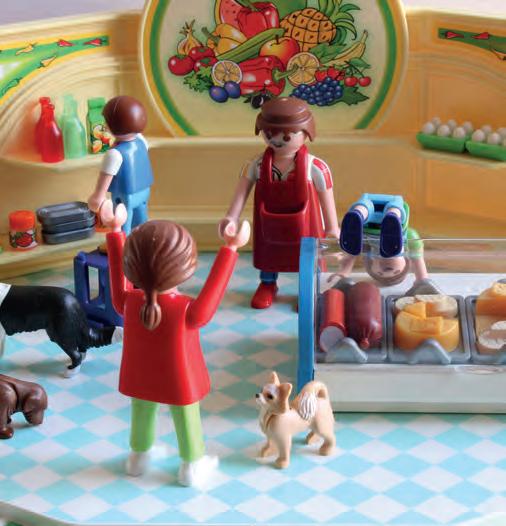
FFD says: As the Government’s ‘roadmap’ progresses and restrictions are lifted, you should be expecting more people in store – and they’ll be very keen to get back to normal. Don’t feel pressured, though. If you want to keep trading with some COVID rules (like social distancing or limiting numbers on the shop floor), then just make sure your customers know. They’ll understand and the exuberance will ease up as the year goes on.
editorial@gff.co.uk
THE DELI DOCTOR
Paul Thomas
Technical and regulatory advice from the Guild’s deli helpline
Q: How often do I need to perform
refrigerator temperature checks?
A: Some foods, either marked as “keep refrigerated”, or ready-to-eat foods bearing a “use by” are stored below 8°C to keep them safe.
Chill-holding tolerance periods are defined in legislation. Foods may be held outside of temperature control (above 8°C) for a single period of no more than four hours. In the event of equipment malfunction, food business operators can defend themselves from enforcement action where the loss of temperature control is for a limited period consistent with food safety. The Food Standards Agency’s (FSA) guidance on temperature control states: “In normal circumstances, a single limited period of up to two hours outside temperature control is unlikely to be questioned. For longer periods, some justification and a hazard analysis based on the HACCP principles may be expected.”
A target temperature of 5°C is recommended in the guidance to ensure that legal requirements are met.
Obviously, checking fridge temperatures
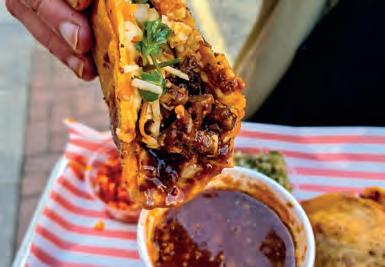
Foods may be held outside of temperature control (above 8°C) for no more than four hours
every two hours may be practically impossible for food businesses. There is, however, a greater chance that food may need to be rejected in the event of refrigerator malfunction where it is not possible to determine the length of time that the food was outside of temperature control.
Temperature checks at least once per day, as recommended in the FSA’s Safer Foods Better Business pack, help businesses to document food safety management. More frequent checks – such as at the start and end of shift – allow for faster identification of upward trends in temperature and possible equipment failure.
Alternatively, a minimum-maximum thermometer will record the highest and lowest temperatures since the last check, while a data logger can evidence the duration for which foods were above 8°C following a breakdown. The frequency of checks should be increased where increasing temperatures indicate potential fridge malfunction.
Dairy and food safety specialist Paul Thomas runs the Guild’s e-helpline for retailers with technical or regulatory queries. Send your questions to myguild@gff.co.uk
Expert’s eye
INSIGHT6’S RICHARD KNIGHT DISCUSSES HOW COVID HAS COVERED FOR POOR CUSTOMER EXPERIENCE
In March last year when the pandemic hit, it was quite understandable that service levels would fall while businesses re-adjusted. However, many major brands are still using COVID as their reason for service not being what it was. Can this be justified?
Let’s take a popular TV subscription service. Customers will have gone up, production costs down and, yet, just try speaking to one of their customer service team on the phone! Meanwhile, plenty of big retailers are taking orders and receiving payment, only to inform customers that it will be months before their purchase is in stock. And any returns have been handled with similar delays, requiring a pick-up to be completed before issuing a refund. Plenty of household names have been quick to take the money but slow at handing it back.
Let’s be honest, the COVID excuse is wearing thin and anyone hiding behind it needs to change their messaging. If you have not sorted out your customer journey maps over the last 12 months, then do you deserve any loyalty? Respect the fact that some customers may want to talk. Now, the vast majority of independent retailers know this and their stores have been thriving during a tough trading time with a brand of customer service that is more personal than the bigger boys offer up.
But it doesn’t hurt to look at how larger businesses and brands have been letting customers down, especially with many retailers and producers
selling to consumers online.
Make sure you are collecting feedback data that reflects the full spectrum of customer experience. In the majority of cases, you might have glowing testimonials. But what about the customers who didn’t get what they were looking for on the website? Whose delivery didn’t arrive? Who was unhappy with their trip to your shop?
Don’t follow the big business example, make your own when it comes to customer experience.
NICK BAINES KEEPS YOU UP TO DATE WITH THE NEWEST DISHES, FLAVOURS AND INNOVATIONS IN FOOD & DRINK
1
2
1 Birria Regional Mexican cuisine continues its upward trajectory despite the hospitality derailment of COVID-19. Right now, it’s a slow-simmered stew that’s gaining the most momentum. Birria is a dish from northern Mexico usually featuring beef, lamb or goat. The spiced mixture is ladled into tortillas but served alongside a bowl of the remaining stew – in which the tacos are ceremoniously dunked prior to eating. TikTok has been hailed as a driving force for birria in the US, where food trucks like New York’s Birria-Landia are serving fans in droves. Here in the UK, Manchester’s Northern Quarter is home to the Birria Brothers, while London has several fly-by-night birria taco slingers gaining traction via Instagram.
2 Reusable spirits pouches Shipping glass bottles has never been straightforward, but a few alcohol brands are pioneering a new idea that makes postage cheaper and easier. Direct-toconsumer subscription service Whisky-Me deliver drams of single malt whisky in a small, pocketsize pouch that’s strong, flexible and stable, meaning no taint to the contents inside. Norfolk’s Bullard’s Spirits has also adopted the pouch approach, so customers can refill their bottles when running low. One of the great advantages of the format is that it is completely letterbox friendly, so drinks can be delivered when no one is home. Both brands are also operating a recycling service for the pouches.
3 Switchel A popular Prohibition-era tonic, switchel is an old American classic that’s enjoying a new-found affection as an alcohol alternative. The gluten-free drink is traditionally made with apple cider vinegar, ginger and honey and is being taken into a sparkling long drink direction by brands like Zingi Bear. Remedy is also in on the switchel action with versions made with blood orange and tropical fruits. Meanwhile, London’s Mother Root has created a concentrated switchel that can be watered down with tonic water or used in mocktails.



